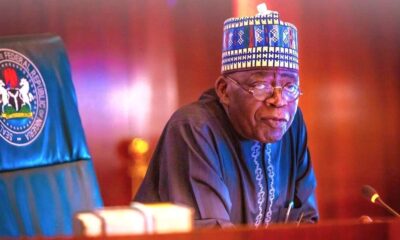Politics
NEGLECTING LIVESTOCK FARMING IN THE PAST WAS A MISTAKE THAT SHOULD NOT BE REPEATED, SAYS PRESIDENT TINUBU
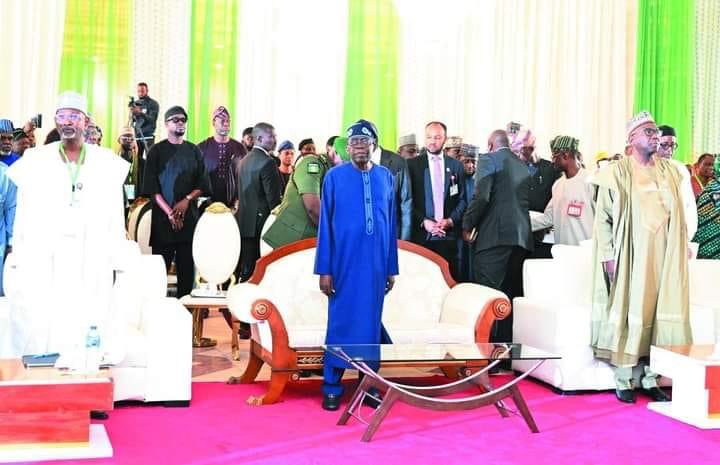
STATE HOUSE PRESS RELEASE
NEGLECTING LIVESTOCK FARMING IN THE PAST WAS A MISTAKE THAT SHOULD NOT BE REPEATED, SAYS PRESIDENT TINUBU
President Bola Tinubu, speaking in Abuja, reassured the public that past mistakes, such as neglecting livestock farming and relying on dairy imports, will be avoided. He pledged a robust framework to stimulate prosperity in the sector, instilling confidence in his commitment.
The President, who opened a two-day Consultative Workshop on Livestock Reforms on Thursday at the State House Conference Centre, pledged government support in revamping and repositioning the sector to create employment and attract foreign Direct Investment (FDI).
“The livestock sector is critical, and we will give all it needs to bring value to our country. Stakeholders, I assure you that you will not regret the collaboration and investment in this sector.
“It is about time that we do it right. A country of over 200 million people and cannot serve our children one pint of milk in a classroom per day? That is not right.
“We didn’t see the investment opportunities. We didn’t see the economy of livestock in the past. Now that we have seen it, we must work together to restart the sector,’’ he said.
President Tinubu commended the Presidential Livestock Reform Implementation Committee, led by the Co-Chairman, Prof. Attahiru Jega, and the Secretary, Prof Muhammed Yahaya Kuta, for their commitment to repositioning the livestock sector.
“Our shared mission is clear: we aim to transform the livestock sector from its current subsistence model into a thriving, commercialised industry, an industry that significantly contributes to Nigeria’s Gross Domestic Product and provides decent jobs and sustainable livelihoods for our growing population.
“The potential is immense: With 563 million chickens, 58 million cattle, 124 million goats, 60 million sheep, and 16 million pigs, Nigeria is the leading livestock producer in West Africa. Yet, despite this vast resource, we face stark realities.
“Our annual production of animal-source foods, like milk at 0.7 billion litres, meat at 1.48 million Tonnes and eggs at 0.69 million metric Tonnes, falls far short of our needs. Our per capita consumption levels—8.7 litres of milk, 9 kg of meat, 3.5kg or 45 eggs per year—are troublingly low compared to global averages. These are 44 litres of milk, 19 kg of meat and between 160 and 180 eggs per year.
“What is more worrisome to me is the average milk yield by cow breeds managed by our pastoralists: it is a mere 0.5 to 1.5 litres per day, compared to a global average of 6.6 litres per day. We can do much better!
“The long-term neglect of the livestock sector has weighed heavily on the country’s import bills, with milk and dairy products accounting for $1.2-1.5 billion.
“Yes, we can do it. We can bring prosperity to our people. We can feed our children. From grass, we can achieve grace. We can contribute so much to the Gross Domestic Product (GDP) and provide decent jobs,’’ the President noted.
President Tinubu also thanked the Nigerian Governors Forum, NGF, chaired by the Governor of Kwara State, Abdurrahman Abdulrazaq, for supporting the reform of animal farming in the country.
“Your Excellency, Chairman of the NGF, Abdulrazaq, thank you for assuring C-of-Os and other instruments from other areas. I also know that the Etsu Nupe, Alhaji Yahaya Abubakar, with the vast land in his domain in Niger State, will accommodate many investors.
“We didn’t see the cold room investment. We didn’t see that opportunity before now. But it is coming. We are going to give it all it takes.
“The opportunity is there; when I inaugurated the Presidential Livestock Reform Committee, I didn’t see the path clearly until they started working. Thank you, Prof Attahiru Jega,’’ the President stated.
President Tinubu also acknowledged Abdullahi Ganduje, Chairman of the All Progressives Congress (APC), for nurturing the idea of reforming the livestock stock, Nuhu Ribadu, national security Adviser, and Nyesom Wike, FCT minister, for their commitment to realising the dream.
“We can create a vivid picture of the future we want to see; it’s the future of our country. The economic opportunities for our children, and with that effort, we can say God bless Nigeria,’’ he stated.
The Chairman of NGF, Abdulrahman Abdulrazak, assured of the “100 per cent buy-in of the subnational to make the reform a success because it is not just food security, but national security.’’
Abdulrazaq thanked President Tinubu for leading the initiative by chairing the implementation committee, regretting that past efforts in the same direction were reduced to files in the Ministries of Agriculture in states and local councils due to lack of political will.
He said each state should create a segment for livestock farming and extend the value chain to meat and dairy production.
The Minister of Agriculture and Food Security, Sen. Abubakar Kyari, thanked the President for his “bold action, exemplary leadership and unparalleled commitment to livestock reform.’’
Kyari assured of working with the Ministry of Livestock Development to realise the president’s vision to diversify the economy and empower more Nigerians.
Bayo Onanuga
Special Adviser to the President
(Information & Strategy)
October 24, 2024
Politics
Accord Party Crisis Deepens As Another Governorship Candidate Emerges For Osun Polls
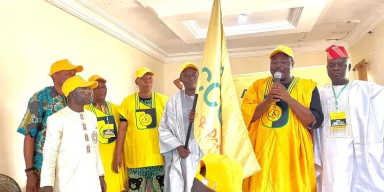
A faction of Accord Party has held its own governorship primary, where Mr. Clement Bamigbola emerged as the faction’s governorship candidate for the 2026 Osun State election.
This is coming just four days after the emergence of Governor Ademola Adeleke as the party’s flag-bearer.
Recall that the party under the leadership of Maxwell Mgbudem, on Wednesday, held a similar exercise which produced Governor Ademola Adeleke as the party’s candidate.
However, a faction of the party rejected his emergence, insisting that Barrister Maxwell Mgbudem is not the legally recognized national chairman of the Accord Party.
In a fresh development on Sunday, about 300 delegates of the Accord Party from across Osun State elected Bamigbola as the factional candidate during a primary held at Regina Suite, Osogbo.
Bamigbola emerged through a voice vote conducted by the delegates, after which the Chairman of the Primary Committee, Hon. Olufemi Ogundare, declared him the party’s candidate for the 2026 Osun State governorship election.
Politics
Tinubu, ECOWAS leaders meet in Abuja over Benin coup, regional stability
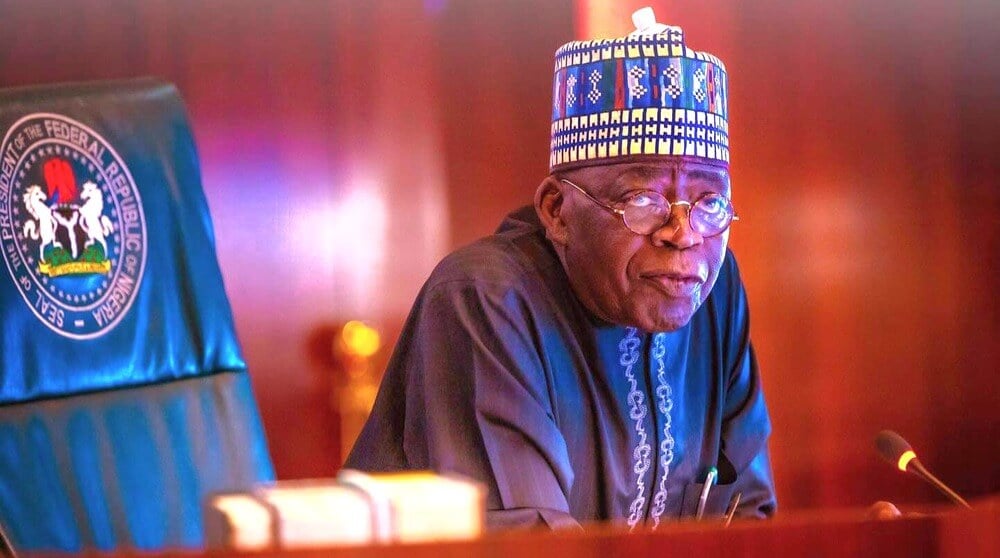
President Bola Tinubu and leaders of ECOWAS countries are currently meeting in Abuja.
The 68th Ordinary Session of the ECOWAS Authority of Heads of State and Government is taking place at the State House Conference Centre, in Abuja.
Leaders of West African countries at the meeting include President Julius Bio (Sierra Leone, ECOWAS Chair), President Patrice Talon (Benin), José Maria Neves (Cabo Verde) and Alassane Ouattara (Côte d’Ivoire).
Others are Adama Barrow (The Gambia), John Mahama (Ghana), Umaro Embaló (Guinea-Bissau), Joseph Boakai (Liberia), Bassirou Faye (Senegal) and Faure Gnassingbé (Togo).
The meeting is coming against the backdrop of five turbulent years for West Africa, which saw coups in Mali (2020, 2021), Burkina Faso (twice in 2022), and Niger (2023).
The latest incidents include an attempted coup in Benin on December 7, 2025, and renewed instability in Guinea-Bissau.
At the time of filing this report, details of the meeting are yet to be disclosed.
Politics
Breaking: Diri Orders Autopsy on Bayelsa Deputy Governor’s Death, Warns Against Politicisation
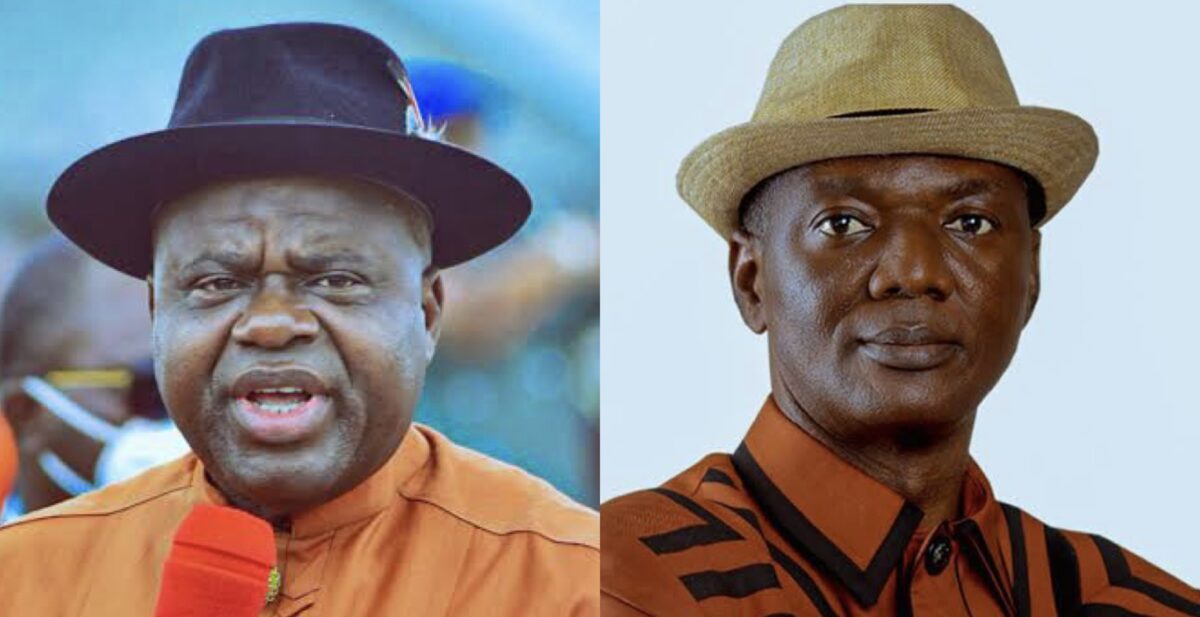
Bayelsa State Governor, Senator Douye Diri, has ordered an autopsy to determine the cause of death of the state’s Deputy Governor, Lawrence Ewhrudjakpo.
Governor Diri gave the directive on Saturday while receiving former President Goodluck Jonathan at the Government House in Yenagoa.
Reacting to the incident, the governor condemned what he described as widespread misinformation and speculation on social media, warning against any attempt to politicise the deputy governor’s death.
“I want to make an appeal. I have seen people politicise his death. In Ijaw land, there is no enmity in death. Let nobody politicise the passing of our dearly beloved deputy governor,” Diri said.
“If anyone truly loves him, this is the time to show it. I have directed that an autopsy be carried out to reveal the cause of his death. There is a lot of nonsense going on on social media.”
The governor further urged the public to focus on mourning and honouring the late deputy governor, noting that the state government had declared three working days of mourning in his honour.
“If anyone is issuing statements to eulogise him, let it end there. Let us mourn him because Bayelsa State is in a mourning mood,” he added.
Governor Diri also called for unity and love among the people, reminding them of the inevitability of death.
Speaking during the condolence visit, former President Goodluck Jonathan described the late Ewhrudjakpo as a committed and dedicated individual who played a key role in the activities of his foundation.
“For me, he was someone my foundation and I will never forget. He represented the governor in all our programs,” Jonathan said, adding that Ewhrudjakpo worked tirelessly in that role, even more than when he served as deputy governor.
-
Business1 year ago
US court acquits Air Peace boss, slams Mayfield $4000 fine
-

 Trending1 year ago
Trending1 year agoNYA demands release of ‘abducted’ Imo chairman, preaches good governance
-

 Politics1 year ago
Politics1 year agoMexico’s new president causes concern just weeks before the US elections
-

 Politics1 year ago
Politics1 year agoPutin invites 20 world leaders
-

 Politics1 year ago
Politics1 year agoRussia bans imports of agro-products from Kazakhstan after refusal to join BRICS
-
Entertainment1 year ago
Bobrisky falls ill in police custody, rushed to hospital
-
Entertainment1 year ago
Bobrisky transferred from Immigration to FCID, spends night behind bars
-
Education1 year ago
GOVERNOR FUBARA APPOINTS COUNCIL MEMBERS FOR KEN SARO-WIWA POLYTECHNIC BORI






